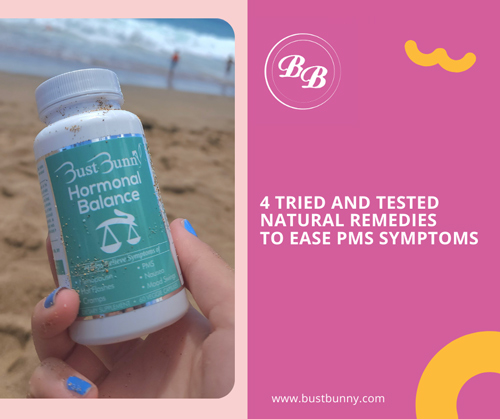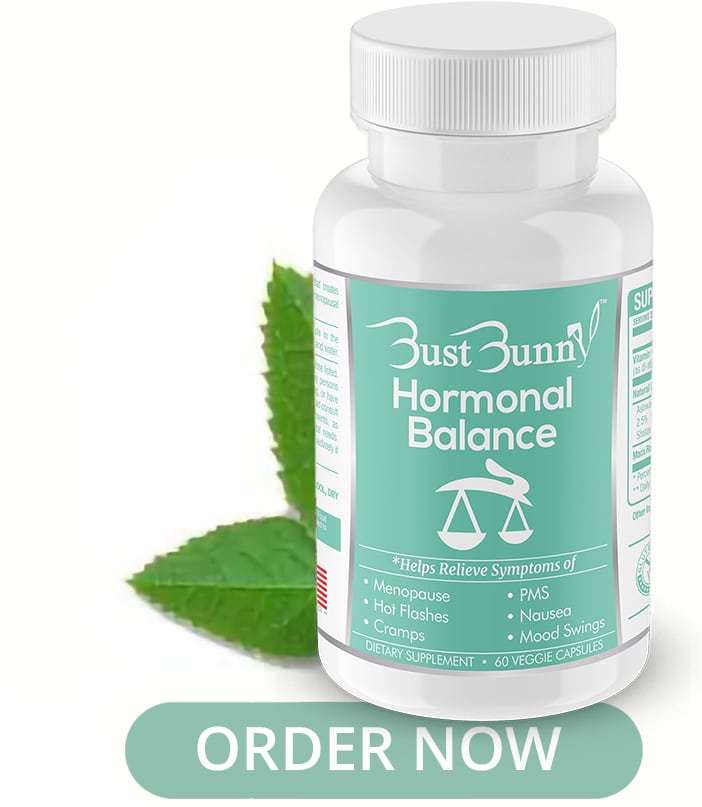Premenstrual Syndrome (PMS) is a group of physical, psychological, and emotional symptoms that many women experience in the days leading up to their periods.
The key symptoms of PMS include:
- Anxiety
- Depression
- Mood swings
- Bloating
- Headache
- Breast tenderness
- Changes in sex drive and appetite
While the symptoms vary from woman to woman, they can be quite severe for some. Factors that can contribute to the severity of PMS include underlying health conditions and fluctuating female reproductive hormones (estrogen and progesterone).

What you eat and your level of activity could also worsen the symptoms. Therefore, knowing which foods and activities aggravate your symptoms can help you avoid them or modify your lifestyle to reduce the severity of your PMS symptoms .
Moreover, taking plant-based herbal supplements such as Bust Bunny’s Hormonal Balance can help you manage the symptoms more effectively and live a more comfortable life before, during, and after your monthly cycle.
That said, here are 4 tried and tested natural remedies for PMS symptom relief.
1 – Regular Physical Activities
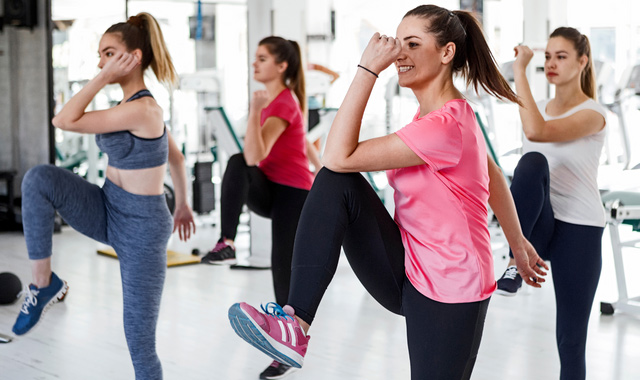
Exercise is beneficial for women experiencing PMS symptoms because it improves blood circulation and metabolism.
It improves overall circulatory system function by increasing blood flow, allowing your body to deliver more oxygen and nutrients to your cells. When these cells are properly nourished, they can deal with the hormonal fluctuations associated with PMS.
Exercise also increases endorphin levels, which are hormones that improve your mood and help with stress relief.
It’s about time you replace Netflix with some exercise that doesn’t have to be hard, boring, or time consuming. Here are some of the best aerobic exercises to help ease PMS symptoms:
Running
Running is one of the easiest and most effective exercises for improving blood circulation.
When running, your breathing pattern changes, and there is an increased demand for oxygen as your heart pumps harder to circulate oxygenated blood to your brain and muscles. The increased blood oxygen levels can help ease PMS symptoms such as bloating, fluid retention, and fatigue.
Running is also an excellent way to de-stress and unwind after a long day.
Biking
A gentle 1-2 hour long bike ride is an effective way to relieve PMS symptoms.
Cycling provides a low-impact workout that helps to improve mood and boost energy levels while reducing inflammation and stress.
Whenever you cycle, your body releases endorphins (a natural painkiller) that can provide some relief from PMS pain and discomfort.
Hiking
Hiking is a great exercise for improving circulation and reducing inflammation. It relieves PMS mood swings, stress levels, and allows you to connect with nature.
Brisk Walking
Walking is a low-impact exercise that benefits your overall health and may indirectly improve PMS symptoms. As such, if you are experiencing symptoms such as bloating, fatigue, or mood swing, brisk walking may be a good way to ease those symptoms.
Pro Tip: Extremely vigorous exercise may make the problem worse rather than relieving the symptoms. Intense exercise interrupts hormones that are responsible for balancing your menstrual cycle.
2 – Maintaining a Healthy Eating Lifestyle
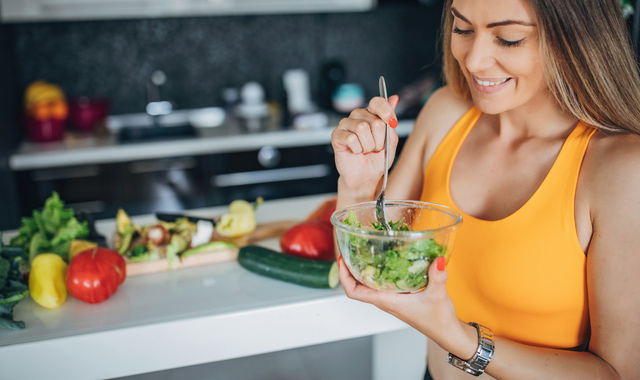
Unhealthy foods (foods high in sugar) can aggravate PMS symptoms such as cramps, bloating, and fatigue.
Sticking to foods that nourish your body during this time, can improve your overall comfort level. Healthy food choices also help to:
- Regulate your hormones
- Reduce inflammation
- Support detoxification
Foods to Eat
There are many natural foods that can help ease PMS symptoms. However, it’s important to note that the effectiveness of the foods you eat at relieving PMS symptoms will vary from person to person—just like the symptoms.
The table below shows the some foods that relieve PMS symptoms.
| Foods | Impact | Examples |
| Fruits |
|
|
| Leafy vegetables |
|
|
| Whole grains |
|
|
| Fish |
|
|
| Nuts |
|
|
| Lean Meat |
|
|
| Water |
|
|
Foods to Avoid
While you might be aware of the foods to eat during PMS, knowing what to avoid can also help you keep things in balance.
The table below shows the foods you should limit to reduce PMS symptoms.
| Foods | Impact | Examples |
| Salty foods |
|
|
| Alcohol and Caffeine |
|
|
| Caffeine |
|
|
| Sugary foods |
|
|
3 – Getting Enough Sleep
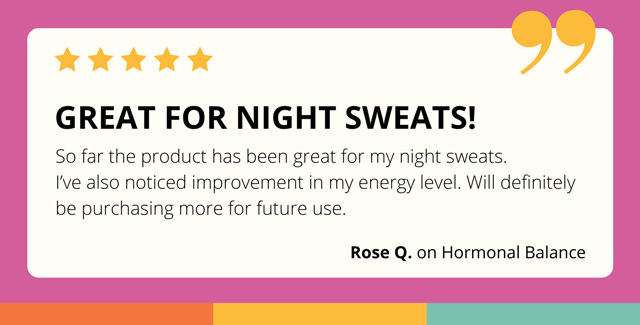
Sleep lets your mind and body recharge, ensuring you’re alert and refreshed when awake. In fact, sleep is just as essential as exercising and eating a balanced, nutritious diet.
Aim to sleep at least 7 to 9 hours a night, particularly during the week leading to your period.
Here are some tips to help you get the best night’s sleep:
- Establish a regular bedtime routine: This will help you relax before bed and fall asleep faster.
- Avoid caffeine and alcohol before bed: These stimulants can increase anxiety and make it harder to fall asleep.
- Optimize your bedroom for better sleep: A cool, dark, and quiet bedroom helps to promote restful sleep.
- Practice some form of relaxation before bed: You can meditate or do deep breathing exercises before bed.
- Do some exercises during the day: Being active boosts your feel-good endorphins, relieving your stress and making you have a good night’s sleep.
- Eat a nutritious breakfast and dinner: This will help you feel energized and alert during the day, which makes it easier to fall asleep at night.
- Avoid using electronic devices right before bedtime: These screens emit light that contributes to keeping you awake.
While there isn’t a one-size-fits-all sleep approach to relieving PMS symptoms, taking hormonal balance supplements and incorporating some of these tips into your daily routine will help you lessen PMS symptoms.
4 – Taking Dietary Supplements
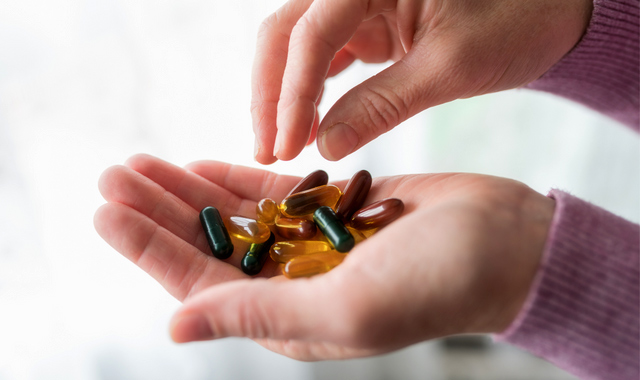
Supplements offer an extra nutrient boost by bridging nutritional gaps when needed. They ease PMS symptoms by boosting energy levels, improving mood, and aiding in the regulation of hormones.
Some of the most commonly recommended supplements for PMS symptom relief include:
Magnesium
Magnesium is important for energy production and strong nerve function. Research studies show that magnesium, along with vitamin B-6, are effective in easing PMS symptoms, including:
- Insomnia
- Anxiety
- Water retention
- Breast tenderness
- Depression
Vitamin B6
Vitamin B6 is essential for producing energy and regulating mood and hormone levels. It helps ease PMS symptoms such as:
- Irritability
- Mood swings
- Bloating
- Anxiety
Calcium
Calcium levels fluctuate throughout a woman’s menstrual cycle. Due to this, those with PMS symptoms may not get sufficient calcium from their diet.
Besides taking calcium pills, adding calcium-rich foods to your diet can help you fight PMS symptoms such as fatigue and bloating
The Solution to Your PMS Symptoms
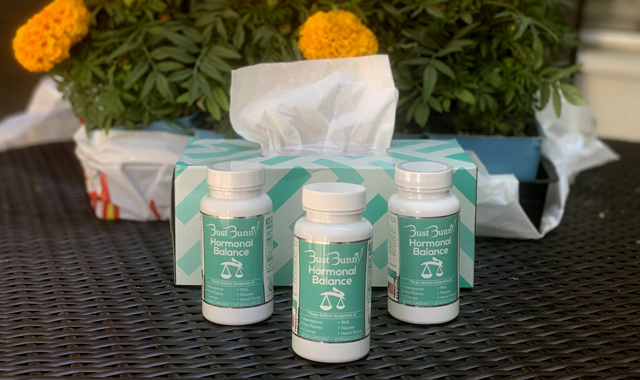
While the precise cause of PMS is not known, it’s clear that progesterone and estrogen levels usually drop a week before your period. Most experts believe these hormonal shifts are the root cause of PMS symptoms.
This is why they recommend taking natural hormonal balance supplements and eating the right foods, getting enough sleep, and exercising.
Bust Bunny’s Hormonal Balance supplement is a blend of natural herbs known to help relieve:
- Recurring night sweats
- Moodiness
- Bloating
- Cramps
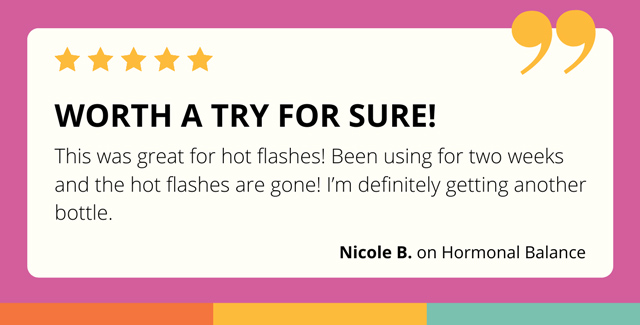
Share on Instagram:
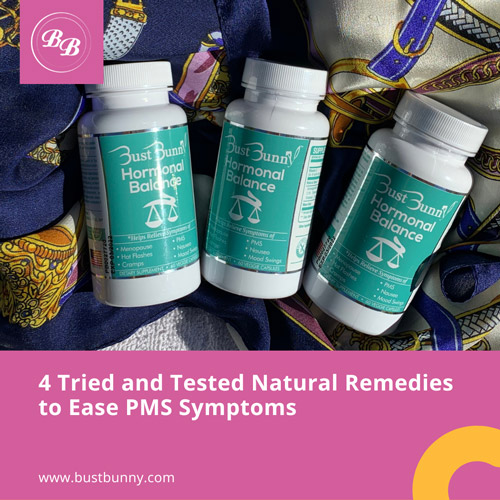
Share on Facebook:
